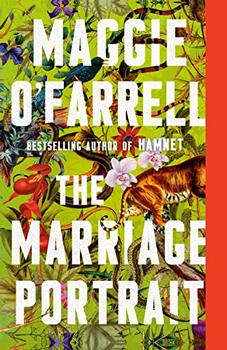Summary | Excerpt | Reading Guide | Reviews | Beyond the Book | Readalikes | Genres & Themes | Author Bio

A novel
by Maggie O'Farrell
He is setting an elbow on either side of his plate, telling her about coming to this lodge—as he persists in calling it—when he was a child, how his father used to bring him hunting here. She is listening to a story about how he was made to release arrow after arrow towards a target on a tree until his fingers bled. She is nodding and making sympathetic murmurs at appropriate moments, but what she really wants to do is look him in the eye and say: I know what you are up to.
Would he be surprised, wrongfooted? Does he think of her as his innocent, unworldly wife, barely out of the nursery? She sees it all. She sees he has laid his scheme so carefully, so assiduously, separating her from others, ensuring that her retinue was left behind in Ferrara, that she is alone, that there are no people from the castello here, just him and her, two guards stationed outside, and a handful of country servants to wait on them.
How will he do it? Part of her would like to ask him this. The knife in a dark corridor? His hands about her throat? A tumble from a horse made to look like an accident? She has no doubt that all of these would fall within his repertoire. It had better be done well, would be her advice to him, because her father is not someone who will take a lenient view of his daughter's murder.
She sets down her cup; she lifts her chin; she turns her eyes on to her husband, Alfonso, Duke of Ferrara, and wonders what will happen next.
The Unfortunate Circumstances of Lucrezia's Conception
Palazzo, Florence, 1544
In the years to come, Eleanora would come to bitterly regret the manner in which her fifth child was conceived.
Picture Eleanora in the autumn of 1544: she is in the map room of the Florentine palazzo, a chart held close to her face (she is somewhat short-sighted but would never admit this to anyone). Her women stand at a distance, as near to the window as they can get; although it is September, the city is still suffocatingly hot. The well of the courtyard below seems to bake the air, wafting out more and more heat from its stone rectangle. The sky is low and motionless; no breeze stirs the silk window coverings and the flags on the palazzo's ramparts hang limp and flaccid. The ladies-in-waiting fan themselves and blot their foreheads with handkerchiefs, sighing noiselessly; each of them is wondering how much longer they will be required to stand here, in this panelled room, how much more time Eleanora will desire to peruse this map, and what she can possibly find so interesting about it.
Eleanora's eyes rake over the silverpoint rendering of Tuscany: the peaks of hills, the eel-like slither of rivers, the ragged coastline climbing north. Her gaze passes over the cluster of roads that knot themselves together for the cities of Siena, Livorno and Pisa. Eleanora is a woman all too aware of her rarity and worth: she possesses not only a body able to produce a string of heirs, but also a beautiful face, with a forehead like carved ivory, eyes wide-set and deep brown, a mouth that looks well in both a smile and a pout. On top of all this, she has a quick and mercurial mind. She can look at the scratch marks on this map and can, unlike most women, translate them into fields full of grain, terraces of vines, crops, farms, convents, levy-paying tenants.
She puts down one map and, just as her women are rustling their skirts in readiness to leave for a better-ventilated room, she picks up another. She is studying the area just inland from the coast; there seem to be no marks made upon that section of the chart, other than some indistinct and irregular patches of water.
If there is one thing Eleanora cannot abide it is a lack of purpose. Under her jurisdiction, every room, every corridor, every antechamber of this palazzo has been renovated and put to use. Every bare plaster wall has been adorned and beautified. She will not allow her children, her servants or her women an empty minute in their days. From the moment they wake to the moment they rest their heads on their pillows, they are kept occupied by a schedule she has designed. Unless she is asleep, she will be engaged in a task: writing letters, taking lessons in languages, making plans or lists or overseeing the children's care and education.
Excerpted from The Marriage Portrait by Maggie O'Farrell. Copyright © 2022 by Maggie O'Farrell. All rights reserved. No part of this excerpt may be reproduced or reprinted without permission in writing from the publisher.
Give me the luxuries of life and I will willingly do without the necessities.
Click Here to find out who said this, as well as discovering other famous literary quotes!
Your guide toexceptional books
BookBrowse seeks out and recommends the best in contemporary fiction and nonfiction—books that not only engage and entertain but also deepen our understanding of ourselves and the world around us.